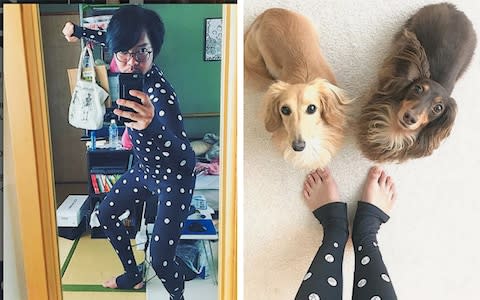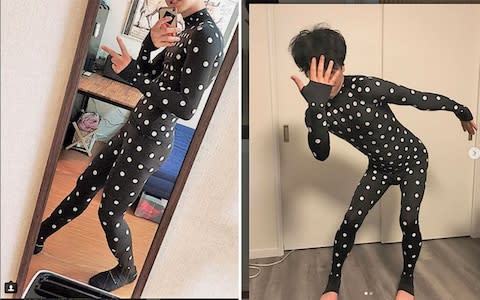Can the Zozosuit fix vanity sizing on the UK high street?
Never mind ice-cream pastels or selvedge denim. The outfit I’m squeezing myself into in an empty boardroom in Tokyo is, apparently, the mother of all Japanese fashion trends: it is black, shiny and completely skintight, stretching unforgivingly from neck to toes, and it’s covered in white polka dots.
Once dressed, I feel like an unglamorous cross between a ninja and a dalmatian – yet if its creators are to be believed, this slinky black number could revolutionise the global fashion industry.
It’s called the Zozosuit – comprising lightweight leggings and a top – and it has a purpose far more inspired than it may appear. The name is derived from the Japanese word sozo, which means creation and imagination. The suit itself is covered with roughly 300 hi-tech sensors (the polka dots) and, when linked up with a smartphone app, can capture dozens of precise body measurements.
Rather than visiting a shop or browsing a website to buy new clothes, shoppers just pull on their Zozosuit, open the Zozo app on their smartphone, and do a very slow twirl in front of their phone, while it takes a series of 12 photographs measuring 24 parts of their body.
These measurements can then be used to buy jeans, T-shirts, business suits and other clothes direct from the app that are custom-made to their exact size. If the suit catches on, the implications for the fashion industry will be enormous. After decades of arranging garments into rigid sizing systems, digitally bespoke clothing would throw these restrictions out of the window.

And imagine for one blissful moment a world where you don’t need to squash into a tiny changing room with glaring lighting and unflattering mirrors, and squish yourself into off-the-peg clothes that never quite fit. Then there are the benefits for the retailers: reduced return shipping costs, fewer storage requirements and, ultimately, less waste.
In the first 10 hours after the Zozosuit launched in Japan in November 2017, roughly 230,000 orders were placed and since then there have been more than a million. The company says it expects to distribute up to 10 million suits by March 2019, not entirely unrealistic given that Zozosuit launches in the UK and 72 other countries and regions (including India, China, the US and Brazil) this Wednesday.
As for the clothes themselves, the Zozo collection in Japan comprises eight garments for men and six for women – mainly affordable basics a little reminiscent of Uniqlo, such as T-shirts (priced from 1,200 yen, or £8) and jeans (from 3,800 yen, or £26), as well as a men’s business suit, which launched this month. Similarly, the UK capsule collection will include six items each for men and women. A global campaign is also underway, offering the next 100,000 customers who order the suit a free bespoke T-shirt and pair of jeans, too.
The unlikely entrepreneur behind the concept is one of Japan’s youngest billionaires, 42-year-old Yusaku Maezawa, a former rock drummer who founded the country’s biggest e-commerce fashion site, Zozotown – and who last year broke art auction records by buying a Jean-Michel Basquiat painting for $110.5 million.
46 per cent of UK women struggle to find clothes that fit
I first interviewed Maezawa last summer, and found him pottering barefoot around his plush Tokyo duplex, surrounded by artworks by Picasso, Yayoi Kusama and Giacometti. (The following day, he flew on his private jet to the south of France for a party with his friend Leonardo DiCaprio.)
Today he is in work mode, preferring to meet at his Tokyo offices, a hipster-style space in the fashionable Aoyama district, filled with hanging-basket chairs, lush plants and round, transparent meeting rooms that resemble bubbles. (The company headquarters are based near his home town of Chiba, just outside Tokyo, and he also has offices in Los Angeles and Berlin.)
Maezawa sits on a red-leather chair at a vast, white, moon-like table inside one of the meeting-room pods, tapping away on an iPhone in a Louis Vuitton case. He’s not wearing a Zozosuit but he points out that his grey T-shirt and blue jeans are from the Zozo collection. ‘I have every single Zozo item, in every colour,’ he says. ‘Actually I can’t wear any other denim now because these fit me so perfectly.’

Later in the conversation he admits: ‘I’m quite short compared to average sizes, so it has always been difficult to find a perfect fit. It’s something that’s bothered me for a long time. I realised that if I was having trouble finding perfectly fitting clothing, then many others must have the same problem.’ So what was it like trying out the Zozosuit himself? ‘I am not exaggerating, but I was really very moved,’ he tells me, animated. ‘And when I tried on the first pair of denim pants, I was really impressed.’
Now his company motto is ‘Make the world a better place, bring smiles to the world’, though his own personal goal is somewhat more focused: he wants to revolutionise the way that people shop for their clothes online, and to become one of the world’s top 10 apparel companies. ‘I’m hoping to target as many people as there are in the world – six or seven billion,’ he says. ‘I want the idea of ordering bespoke online clothing to become part of the infrastructure of daily life – just like electricity, water, gas.’

The Zozosuits themselves are largely made in China, using automated pattern-cutting techniques based on thousands of templates for various body shapes, though he plans to open smaller production bases around the world. The suits cost around 1,000 yen (about £6.70) to make but are sent to customers free of charge.
Though it sounds like an odd business model, Maezawa is banking on high Zozo sales to generate a profit. The company forecasts 200 billion yen (£1.35 billion) in sales in the financial year starting in 2020, 40 per cent of which is expected to be from outside Japan.
In the early days after the launch of the Zozosuit, Maezawa had a bumpy start. Delays in delivery were reported in some of the local press and an earlier version of the Zozosuit was replaced with the current ‘improved’ version – but scroll through Instagram today and it’s another story. Thousands of Japanese owners have posted selfies of themselves dressed in the eye-popping suits – a few have even dressed their dogs in them.
There are pictures of people wearing Zozosuits while working in offices, drinking tea, even doing yoga (fortunately the suit is machine washable). And then there is ‘Isoppmen’, a former breakdance champion who posted a series of videos online, including one of a dance troupe performing bouncy, boyband-style routines while all wearing the suit.
Suits you? | Danielle demetriou puts the Zozo through its paces…
Judging by Japan’s reputation as an incubator of trends, it’s only a matter of time before the suit takes off in the UK, too – particularly given how many British women struggle to find well-fitting clothes on the high street.
‘The issue of discrepancies in clothes sizes is not a new problem, but it remains an ongoing issue for consumers,’ says Tamara Sender, senior fashion analyst at Mintel. ‘As women are opting to shop more online for clothes, problems of fit are exacerbated as they can’t try clothes on before buying them.’
According to Mintel, 46 per cent of British women struggle to find clothes that fit them well. Sender also points out that 61 per cent of women shoppers aged 16 to 34 return clothes because they don’t fit well. ‘In an increasingly competitive clothing market, retailers that look to find solutions to the issue of sizing and fit for customers shopping both in-store and online will stand out from rivals.’
Maezawa and his distinctive polka-dot suit have certainly done that. ‘The era of small, medium and large sizing is coming to an end,’ he says. ‘I believe that from now on, people should not have to try to fit into clothing – clothing should be made to fit people.’
Newsletter promo - Stella - End of article
More from Telegraph Magazine Investigative Feature 5 July 2018
